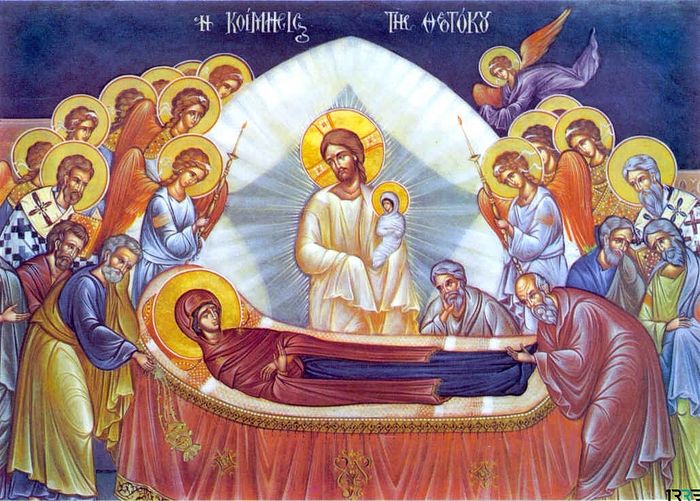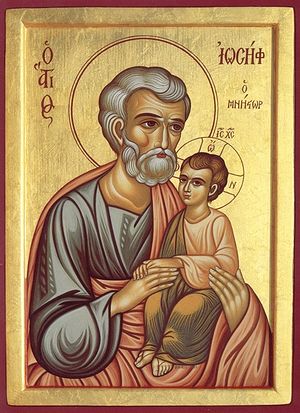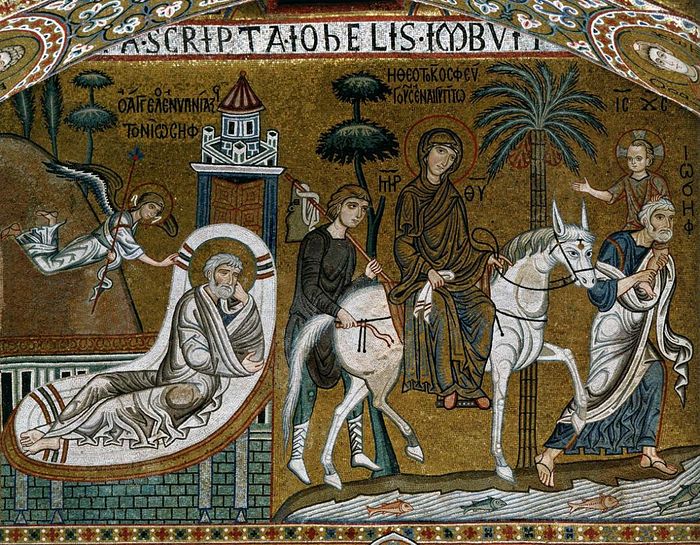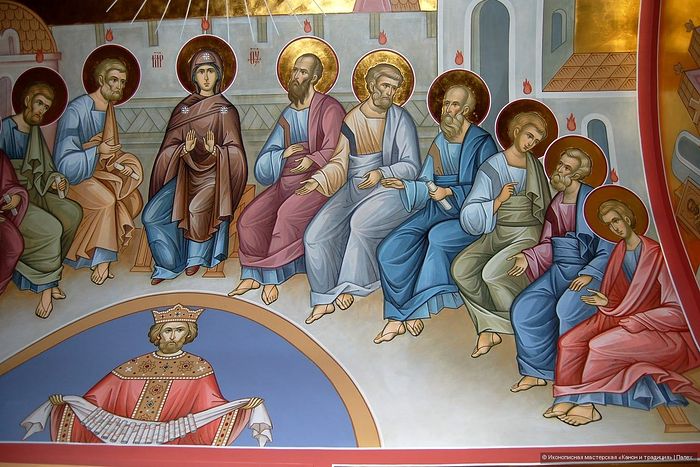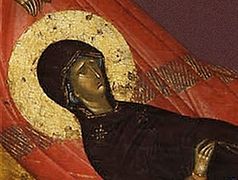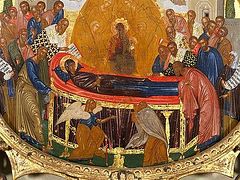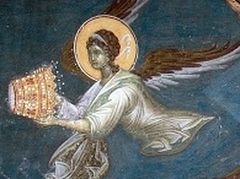Once, the Prophet David, moved by the Holy Spirit, spoke about the future life of the Most Holy Theotokos: The king's daughter is all glorious within (Ps. 44:14). That is, the glory that befits the future daughter of the King (as he called the Most Holy Theotokos) will be hidden, turned within, unseen even by her loved ones.
According to human conceptions, while a man is yet alive, the glory that surrounds him because of his fame, because of his strength or power, because of some deeds, spreads more and more. The man himself usually strives to glorify himself here on Earth while he is yet alive. For we all know that with death, day after day, oblivion comes for every man. The people even have a proverb that the coffin is an advocate for oblivion. And the more time passes from a man’s death, the less people tend to remember him.
Therefore, the glory that surrounds a man spreads out from him during his life. Here the Prophet David shows us that the spiritual law, the Gospel law, the law according to which the Most Holy Theotokos lived, the law given to us Christians, acts contrary to the worldly law.
While she was on Earth, she lived in obscurity; it was only from the day of her passing to God (or, as the Church calls it, from the day of her Dormition) that this glory began to spread throughout the Earth. And no matter how far or how great this glory spreads, this God-befitting glory of the Most Holy Theotokos, we see no limit or end!
How do we explain this prophecy of the holy David the Psalmist? Why did the glory of the Most Holy Theotokos, which she was filled with even during her life on Earth, remain unknown to people, becoming known only after her Dormition?
For this, we have to look not only at the Dormition itself, but at the very life of the Most Holy Theotokos; and we will see that all of her virtues, all the fullness of grace that filled her soul and body was concealed by a deep covering of humility—personal humility, to which is added God’s covering—the providential covering that hid her extraordinary glory as the daughter of the King from human eyes.
The protector of her virginity, the Righteous Joseph, began to doubt that his betrothed truly kept her virginity. He seriously suffered from it. He was confused: How could she, who had given an oath, now be pregnant, having a child in her womb?
The word of the Most Holy Theotokos alone was enough to destroy all of St. Joseph’s doubts. She could have told him about the appearance of the Archangel Gabriel; she could have preached to him in detail about the Annunciation and descent of the Holy Spirit. There is no doubt that God would have attested to her every word!
But she was silent, leaving the Righteous Joseph to doubt. She was silent because she was concealing her virginity, concealing the mystery of the Annunciation by her humility. She concealed it so that God Himself, in some way unknown to her, would reveal this mystery to the Righteous Joseph.
And so her humility overcame St. Joseph’s confusion, and it was not her but an angel that appeared to him and said, “Fear not, your betrothed has not broken her vow! Take her and keep her in your home, because from her will come God, Who will save the human race.”
And then, our Savior was born, the angels in Heaven proclaimed the news, and the magi came from distant lands. The shepherds came to give glory to the newborn Christ. Here it would seem that, together with the glorification of her Son, glory should touch her too—as His mother…
But the magi departed, the shepherds left, and the Heavenly praise remained, it would seem, unknown not only to man, but even to the Jews, who lived nearby. And instead of glorification following the Nativity of Christ, the heavy persecution of Herod and the flight into Egypt awaited her.
Then her Son, having reached the appropriate age, began to preach for our salvation. Perhaps this glory that surrounded Christ during His preaching also touched her? But we see that a certain woman, struck by the Savior’s majesty and the miracles He performed, exclaims: Blessed is the womb that bare Thee, and the paps which Thou hast sucked (Lk. 11:27). She blesses the Mother of God, but the Mother of God herself remains unknown to her. She doesn’t know her name, otherwise, undoubtedly, she would have said, “Blessed is Mary who bore Thee!”
Others knew her name: those close to her, who lived with her. But they remained unaware that she belonged to the royal family. And, amazed by the miracles and wisdom of the Savior, they said, “Is He not the carpenter’s son; is He not the son of Mary who lives among us, who is simple like us? Whence then does he have such wisdom and such power?!” (cf. Mt. 13:55).
Perhaps the glory of the Mother of God should have touched her and revealed itself through the direct instruction of her Son, as is usually the case when we want to glorify our loved ones.
But we see that, on the contrary, the Savior, Christ Himself, conceals the glory of the Mother of God. When people came to Him and said, “Your mother and brothers want to see You,” He said, as if not taking notice of it, “And who is My mother? He who hears the word of God!” (cf. Mt. 12-46-50).
And we know that there has been no one on Earth who more fulfilled the will of God, who listened more to Christ, the Son of God, than His all-pure mother.
We see that the Most Holy Theotokos was not with her Son in instances when He had some glory, as happened for a short time, for example, during His entrance into Jerusalem; not when, having performed a miracle, He received people’s gratitude; but she is mainly with him when He was experiencing humiliation. She stood at His Cross: at the cross of all His preaching, and the Cross of His Crucifixion—when the people—both His closest disciples and everyone else withdrew from Him.
Then her Son resurrected, and the glory of the Resurrection began to spread throughout the whole world. But we don’t find in the Gospel a single world about when the Mother of God found out about the Resurrection. Church Tradition tell us in our sacred hymns that an angel first appeared to her to tell her about the Resurrection of her Son.
Even Sacred Scripture conceals with humility that which was formed in the heart of the Most Holy Theotokos!
Finally, the apostles went and preached throughout the entire world; and the Mother of God, as Church Tradition tells us, was the soul of the apostolic community. It was she that told the apostles about how the Savior spent His childhood; it was she that told the apostles about the Annunciation; it was she that told the apostles about so much that they could not have known about, for they came to know Christ only when He had already begun to preach.
But the Acts of the Apostles describes to us the place that the Most Holy Theotokos held in the apostolic community. It tells us that after the Ascension, the apostles were in Jerusalem together with other disciples (and they are listed by name), awaiting the descent of the Holy Spirit. They were afraid, and because they were afraid, they were waiting for this descent all together, being of one spirit.
And having listed all twelve apostles, the Evangelist Luke adds that there were also some women with them, including Mary the mother of Jesus (Acts 1:14). This placing of the Most Holy Theotokos by the Evangelist Luke in the last place in the first Christian community truly shows that, despite the fact that she enjoyed the honor, veneration, and respect of all Christians, beginning with the very first, and even with the apostles—she held the place of an ordinary woman who had no say in the decision of ecclesiastical questions.
They addressed her as the Mother of God, but she herself took the last place—lower than the apostles.
Although, it can be said that she is the first among the apostles as a preacher of the Resurrection of Christ.
It is only when the hour of her death arrived (and it behooved the Mother of God to submit and pass through the gates of death, as it does us all) that she who is barely mentioned in the apostolic preaching received extraordinary glory!
The apostles flew to her on angelic powers to honor her Dormition, her departure to God. Having given each of them an instruction, she told about how the Archangel Gabriel appeared to her again and notified her of her imminent union with God.
Church Tradition further tells us that the death of the Most Holy Theotokos was unusual: She seemed to just quietly fall asleep, painlessly. And it wasn’t angels that received her soul, as with ordinary people, but the Lord Jesus Christ Himself appeared to receive the soul of His mother into the Heavenly habitations.
This is where the glory of the Most Holy Theotokos is revealed!
When her bier was being carried to burial, the Jewish High Priest Ananias, wishing to desecrate the burial of the Most Holy Theotokos, stretched out his hands to overturn the casket; but the angel of the Lord cut off his hands with a sword. Seeing this miracle, he came to believe and joined the apostles.
The apostles were all together after the burial of the Most Holy Theotokos. By Divine providence, the Apostle Thomas was not with them during the burial. Thus, in order to assure the Apostle Thomas, to give him the enjoyment of beholding the face of the departed Most Holy Theotokos, the apostles led him to the cave where the Most Holy Theotokos was buried.
When they opened the cave, they found that it did not contain her body.
And indeed, we know from Church history how many relics of the saints of God we have throughout the world, including ascetics, bishops, fools-for-Christ, and righteous ones!
The Church has pieces of the clothes of the Most Holy Theotokos; it has the remains of her belt with which she once girded herself. But we have never heard anywhere that the Church has any particle of her righteous body.
This is because her body was assumed into Heaven and received by Christ the Savior Himself, and it is this ascension that revealed her glory: She went to God before the Last Judgment, and therefore she intercedes for us as the all-powerful mother of the Christian race.
Church Tradition recounts for us that when the apostles would sit and eat, they would usually leave one piece of bread in memory of the fact that the Lord Jesus Christ Himself was invisibly eating with them. When they elevated this piece of bread in memory of their Teacher, then the Most Holy Theotokos suddenly appeared to them in Heaven, who had earlier ascended in her Dormition, and pronounced the words once spoken by her Son, the Lord Jesus Christ: “Rejoice! I am with you always, even unto the end of the age!” The apostles answered these words with the exclamation, “Most Holy Theotokos, help us!”—the same exclamation with which we have addressed her from the first century.[1]
And since then, dear brothers and sisters, when the glory of the Theotokos was spread in Heaven, when she was glorified in Heaven, then the Lord was pleased to spread her glory across Earth as well.
And here the Gospel law began to work contrary to the worldly law: The farther we are from the time of the Dormition of the Most Holy Theotokos, the more the world glorifies and venerates her, the more the world feels her intercession, and the more the world feels her living contact with the entire Church.
Therefore, in her Dormition, as during her entire life, the Most Holy Theotokos gives us a great Christian lesson that none of us should care about glory, but, on the contrary, should conceal our glory while yet living on Earth.
If it is necessary, the Lord will reveal the glory of a righteous one on Earth when he passes over to Him in the Heavenly habitations. Thus, the Most Holy Theotokos edifies and protects us by her Dormition. We turn to her on this feast with pure hearts and with the same exclamation with which the apostles once addressed her: “Most Holy Theotokos, help us!” Amen.

